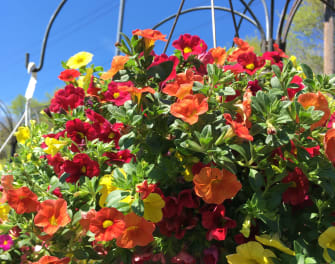Right now, Decker's Nursery is brimming with flowering baskets to use in a number of capacities; in planters, in the ground or to display in your outdoor living areas by hanging them proudly and enjoying them. I find it rewarding when customers find the perfect combination of baskets and other flowers that make them happy. Whenever possible, I try to offer time to discuss the care that will ensure the best performance of their purchases.

I want customers to get the opportunity to enjoy their flowers throughout the summer and make sure that they understand it requires effort to make this happen. Specifically, I try to dispel the myth that you can hang them and schedule watering for every day or two and expect your annuals to perform well. So, here are a couple tips that I think can help improve the performance of all your annual flower plantings - should you find yourself questioning how to do so.
Location, location, location
To start, make sure you select the proper flowers for the location where you're going to use them. If you're not 100% sure of your selection, I plead with you to find one of our associates to help get off on the right foot. We will most often ask questions about sunlight so you can properly prepare for those questions by observing the amount of sunlight, or shade, the plants are going to experience. When I say amount, I mean what is the length of time the plants will experience sunlight during the summer months. Lack of sunlight is also fine it's just important to know how much or how little. Some annuals require 6 hours of sun or more (full sun), some can tolerate no direct sun and these are considered "shade" annuals. There are other annuals that tolerate somewhere in between the 2 extremes. If you manage to select the right flowers for your location, your one-third of the way to success!!
Proper watering is vital
"How often should I water" is a question that we receive often. Some customers actually get upset when we explain, "I can't answer that question". Proper watering requires some basic understanding of herbaceous plants. Not all soils are the same and not all locations are the same. That said, the physiology of annual flowers are pretty consistent. Some annuals prefer to be dry for extended periods while others require consistent water to prevent damage. This is a good question to ask an associate when you're trying to make the best selection. One thing to remember, however, is that over watering does more damage than lack of watering. Also, please don't forget about your flowers when you're on vacation. All too often, we have customers that feel compelled to return their hanging baskets when they return from vacation and swear that the flowers were watered during their absence. It's very easy to diagnose when annuals are neglected.
How to water
Whenever you water your hanging baskets, do it like you mean it. Saturate them completely until the water runs out the bottom. You'll rarely, if ever, want to "partially" water so the easiest way to avoid overwatering is to test the soil. Insert your finger into the soil to a depth of 2", just push it down and get a sense of if the soil is cool or wet. If your finger is cool when you pull it out, it's because it got wet in the soil. If this is the case, wait a little while longer to water again. It's good for many of the annuals to go dry for short periods of time as this is when their roots grow the most.
The challenge for many of us is; we have to go to work, what happens if the plants go dry while you're away? I always say to make an effort to care for your annuals twice a day simply by evaluating the soil moisture and watering when necessary. Eventually, you'll find a pattern and they get easier to manage. Don't get complacent because the weather is constantly changing, rain occurs and temperatures rise. If you make a point of inspecting your annual flowers twice a day and water when they need it you will avoid a lot of heartache. Now you're two-thirds of the way to success!!
Don't forget to fertilize
Finally, when you hear me ask "do you have fertilizer for your annuals?" know that this is an effort on our part to help remind you. Our staff is trained to ask this question because you need to fertilize your annual flowers to assure they bloom as much in the Summer as they do in the Spring. Fertilizer is a topic that can make anyone feel like they're "out of your league" but it doesn't have to be anything drastic or complicated. Any fertilizer that promotes blooming (high in potassium) will suffice. Decker's Nursery offers granular fertilizers and liquid fertilizers alike and you can decide what's easiest for you. At Decker's Nursery, we're big advocates the use of Espoma "Bloom" fertilizer and we always have it readily available. Regardless, our staff will gladly help and if you have a lot of annuals you may want to consider one of the hose end applicators to speed the process up.
Give some consideration to fertilizing your annuals and hanging baskets this year. I'd thoroughly enjoy hearing about your results because it's such a simple thing to overlook. I hope these recommendations make your gardening season more enjoyable. If you follow this simple advice, I think it's safe to say - you're well equipped to be successful with your annual flowers this year. As always, don't hesitate to bring your questions to me when you see me in the nursery and garden center. If I can help anyone connect more with the plants in their life; I'm always more than happy to do so.
